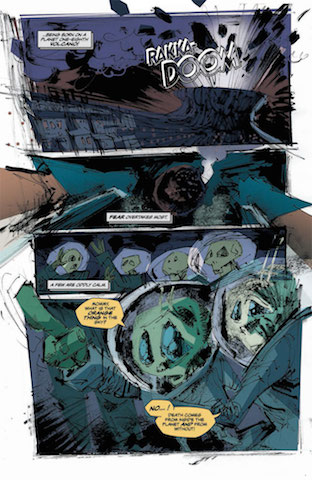![]() The Bigger Bang by D. J. Kirkbride and Vassilis Gogtzilas
The Bigger Bang by D. J. Kirkbride and Vassilis Gogtzilas

That’s a weighty premise set against the biggest of all canvases, and I’d love to say the comic pulls it off. But despite some flashes, I mostly found The Bigger Bang to be a difficult read.
Let me start with the art. I should note that I read this on an iPad via Bluefire, so perhaps things are different through another medium/program. But I found the art to be a major barrier to enjoyment, with it too often being overly muddy and dark, making it difficult to distinguish characters and movements with any kind of detail and robbing them of much of their potential impact. It also robbed the story of some of that big-canvas feel because the various alien races we “see” mostly blend into a dim sameness so  they feel more like props than living creatures. Granted, one’s response to art is going to be highly subjective, so mileage may vary on this, but for me it just had me constantly fighting against it to enjoy (or even at times understand) the story/events.
they feel more like props than living creatures. Granted, one’s response to art is going to be highly subjective, so mileage may vary on this, but for me it just had me constantly fighting against it to enjoy (or even at times understand) the story/events.
As for the story, it was hit and miss. I love the premise — a character tortured by the means of his birth and trying to make amends for that, a character who is known as “Destructor” and feared by all who yearns to be loved, or at least accepted. And a character with some obvious parallels to Superman thanks to his birth, his goodness, his cape, and his god-like powers (seriously god-like: he deals with an ultra-nova, hurtling asteroids, resurrection). Set against his compassion and acts of kindness and protection is King Thule, a power-hungry control freak who thinks nothing of wiping out entire planets to enforce his rule. And somewhere between the two lies one of Thule’s commanders — Wyan — who has always followed his brutal orders without question until her encounter with Cosmos. Had this been drawn out somewhat, the storyline would have had some promise. But it all happens so fast that it serves to trivialize weighty issues and major character reversals. The brevity also makes some of it edge toward the trite and cliché, especially the “relationship” that forms between Wyan and Cosmos. Finally, the grand scale and ponderous themes are also lessened by instances of juvenile humor as well some jarringly modern language/idioms.
When neither plot nor art satisfy in a graphic novel, it’s hard to recommend it. Which is too bad, because there was a good idea underneath the art/story here.



That’s too bad, because it is such a great concept. These may be new writers and you may see improvement as the story continues.